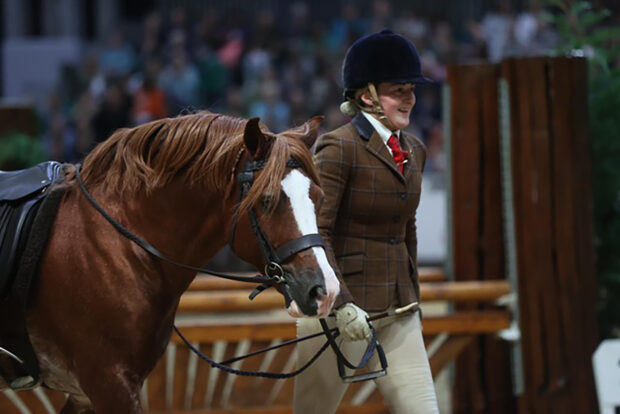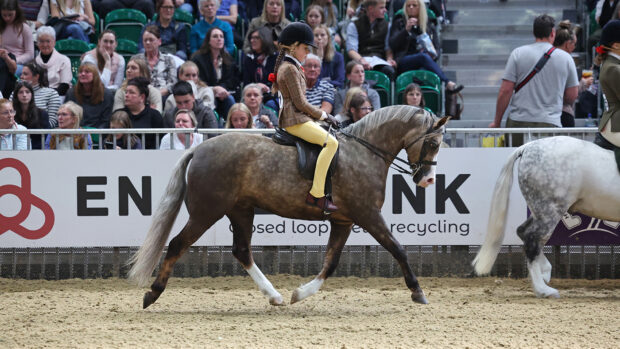The owner of a healthy two-year-old colt who was deemed “too skinny” by a showing judge says she is concerned about the effects such comments could have.
Emma Louise Armstrong entered her Welsh section D Sangrug B That Fancy for an in-hand class at a local show on 11 July, having bought him as a foal to regain her confidence in showing, with dreams eventually of qualifying for Horse of the Year Show (HOYS).
She told H&H she asked someone else to show “Oakley” at his first competition, then took him to another local one herself.
“The feedback from that judge was lovely, and he did really well, so I had the adrenaline to keep showing him,” she said. “I really enjoyed it, and he’s such a sweet-natured colt, so I took him out again to a riding club show last weekend.
“It was all about getting my confidence back, and the judge ripped him to shreds.”
Emma Louise said the class entrants had walked, trotted and completed their individual shows when the judge made his comments.
“He said: ‘Is that a yearling?’ I said no, he’s two, and the judge said: ‘He can’t be a two-year-old, he’s far too skinny’.” she said.
Emma Louise said that having struggled to keep condition on Oakley, as he was unhappy at his first yard, he is now well covered, and “if anything, he’s a bit big”.
“It really disheartened me; I came out of the ring saying I wasn’t going to show him again,” she said. “I thought about sending him to a producer but my yard owner was saying it was only one person’s opinion, and not to let it get me down.
“I think he’s a good example of a section D and I don’t want to push him.”
H&H has reported a great deal on the high levels of equine obesity in the UK and the risks excess weight poses; Emma Louise is concerned that such comments made to some owners could have a negative effect on horse welfare.
“Can you imagine if that was a novice owner, or young person with their first horse?” she asked. “I was a novice once, and when I was 18 and with my first pony, if I’d heard a comment like that, I’d have gone and fed the pony up, thinking it was too skinny and end up with them being too big.”
She added: “I think everyone’s kind comments and support have given me the kick to carry on with him; I want him as my HOYS stallion.”
Showing condition awards
Showing competitors at the Prenetics Royal International Horse Show (RIHS) this week (21-25 July) will again have the chance to win special rosettes awarded to the animals with the healthiest body condition.
After successful trials of the scheme in 2019, including at the RIHS, behaviour change scientist Tamzin Furtado and the Horse Trust’s Jan Rogers will visit unaffiliated and affiliated shows, “providing friendly, supportive advice and guidance to owners, riders and producers, helping them to recognise the benefits of maintaining a healthy body condition”.
“Both local and on-site vets work in conjunction with the judges to score horses in the chosen classes and award a rosette to the healthiest body condition within the class,” a spokesman for the scheme said.
Showing Council chairman and RIHS director of showing David Ingle said: “Showing is keen to become more educational and we are in an era of great improvement in equine welfare, with increasing scrutiny under social licence. This initiative will help to shine a light on this important aspect of showing.”
Continues below…

Show to offer awards for horses of healthiest weight
‘We want to help recalibrate people’s ideas of a healthy weight’

The equine obesity epidemic: what can you do to help?
“No matter what your role is, what are you going to change, to help in this obesity epidemic?”

Subscribe to Horse & Hound magazine today – and enjoy unlimited website access all year round
Dr Furtado added: “Horses who are overweight or cresty are often celebrated for their condition – and we want to slightly challenge that, by celebrating horses in ideal body condition.”
The British Equine Veterinary Association, among others, considers obesity to be one of the main welfare issues facing UK horses.
Ms Rogers said: “We get very upset by seeing photos of underweight horses in the media, but in reality, far more horses are obese than are underweight. This is very worrying for vets who are finding that they have to treat these horses with serious health conditions like equine metabolic syndrome and laminitis. People’s perceptions of what is a healthy weight have shifted towards higher body condition scores, and we would like to help to reset this balance”.
- Do you think the industry is doing enough to combat equine obesity? Email hhletters@futurenet.com, including your name, nearest town and county, for the chance to have your letter published in Horse & Hound magazine and you could win a bottle of Champagne Taittinger.
Horse & Hound magazine, out every Thursday, is packed with all the latest news and reports, as well as interviews, specials, nostalgia, vet and training advice. Find how you can enjoy the magazine delivered to your door every week, plus options to upgrade to access our H&H Plus online service which brings you breaking news as it happens as well as other benefits.





